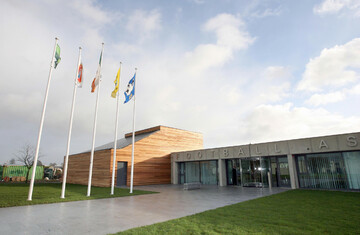THE PUBLIC DISPUTE between the Football Association of Ireland and its workers represented by SIPTU rumbles on, with the trade union today issuing a statement expressing dismay at the Association’s strategic plan and a perceived lack of engagement from FAI CEO Jonathan Hill.
The FAI responded with a statement of their own, defending their strategic plan while saying they are “disappointed” at SIPTU’s airing their complaints in public.
SIPTU first publicly expressed their dissatisfaction with their level of engagement with CEO Hill last April, and today issued a statement saying they have written to Chairperson Roy Barrett and Hill seeking an “urgent meeting” to discuss a “lack of engagement” regarding the new strategy document, and “ongoing concerns about poor work practices.”
“In late 2021, the FAI CEO, Jonathan Hill, committed to taking part in such a meeting during the first three months of 2022. However, we await confirmation of any scheduled date for these discussions to begin”, said Siptu Sector Organiser, Michelle Quinn.
“It is now 14 months since the FAI CEO met with FAI SIPTU shop stewards, despite numerous requests for a meeting”, she added.
The FAI responded with a statement stressing that the Association met with “SIPTU representatives in November 2021 and January 2022″, saying “they remain committed to regular meetings as is good and standard practice.”
“The CEO will meet with SIPTU within Q1 as already agreed and communicated to SIPTU. All FAI staff, including therefore SIPTU members, were invited to consultation meetings and to make written submissions ahead of the drafting of the FAI Strategy 2022-2025″, continued the FAI’s missive.
SIPTU also criticised the content of the FAI’s strategic plan, claiming it is “aspirational and lacking in detail”, and that “it does not have a clear enough focus on player development.”
The trade union produced their own strategic vision document for the FAI last year, titled Towards 25, and they say that “there was very little discussion of this document within the organisation.”
The FAI replied that “player pathways and player development are key pillars of the FAI Strategy 2022-2025 which were formulated following lengthy and broad consultation with all stakeholders in Irish football including FAI staff and therefore any SIPTU members therein”, adding that the Association “notes the views of SIPTU in relation to the Strategy but would respectfully point out that many stakeholders, including Government and members of the football community as well as FIFA and UEFA, have welcomed the document and the clear direction it gives the Association.”
The FAI said they are “again disappointed that SIPTU chooses to use the media to air these issues”, and that “the FAI remains keen to work with those who share our ambition and commitment to deliver against these core objectives.”








odd sidebar to UL is that seadna morey, u21 champ 2012 player of the year hasnt been playing for college although apparently eligible. he’ll almost certainly start for clare on sunday.